By A .N. WILSON FOR THE DAILY MAIL
Perhaps it was the sombre nature of the occasion that caused Prince William to appear so discontented. Maybe it was his buffoon of an uncle, Prince Andrew, gurning with ex-wife Sarah Ferguson. Whatever the cause, there was no mistaking the fact that William appeared angry and unhappy at the Duchess of Kent’s funeral at Westminster Cathedral this week.
He looked to have lost weight, too. He gave the impression of bearing the burden of the world on his shoulders.
Nor did he seem particularly overjoyed to be at the State Banquet for Donald Trump on Wednesday. While Catherine smiled at his side, and charmed The Don, William came across as pensive, less light-hearted than of old.
Of course, the banquet was a masterclass in soft power. At a sticky moment in world history, the pageantry at Windsor Castle seemed to be something much bigger than the Gilbert and Sullivan operetta which it often resembles.
When the world does not know what to make of Donald Trump, the King and Queen in their finery, the Guards regiments in their uniforms, the footmen and flunkies in their livery all cemented a bond that is truly momentous – namely the alliance between Britain and America.
Even those who question the desirability of having a monarchy could see that here it was performing a vital function with extraordinary aplomb.
But William, though dutifully being the first to welcome to the US President and his wife Melania when they arrived at
Windsor, came across as less enthusiastic than he has been at formal royal occasions in years gone by.
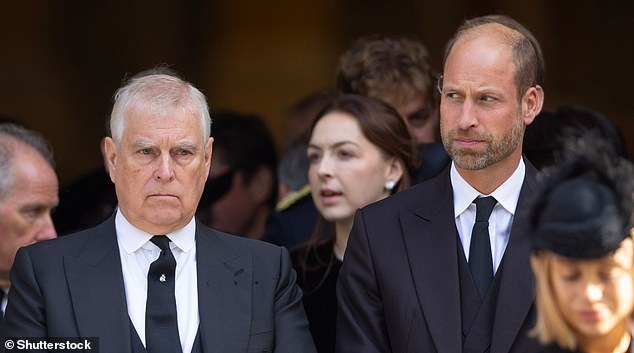
At the Duchess of Kent’s funeral earlier this week, Prince William gave the impression of bearing the burden of the weight of the world on his shoulders
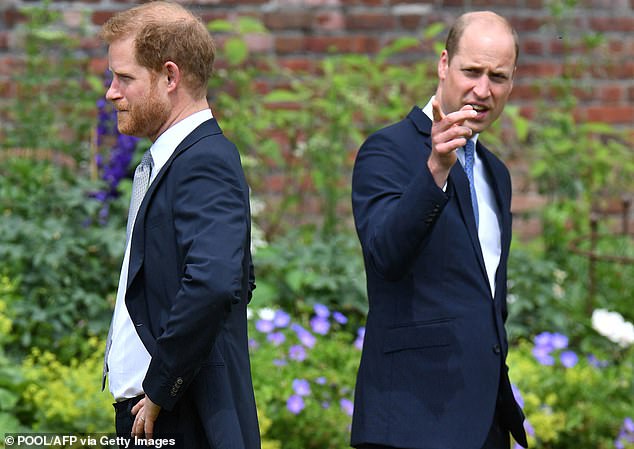
Prince Harry is, A.N. Wilson writes, evidently trying to make a comeback, having recently embarked on a pseudo-royal tour of Britain
Admittedly, there were moments over the last few days when he did seem animated by Donald Trump and looked genuinely pleased to meet him. According to Vanity Fair magazine, William has also become close to Trump after being tasked with launching a ‘charm offensive’ towards him.
In February in Paris, what was initially proposed as a brief encounter between William and the President went on well over-schedule and lasted 40 minutes. Trump has variously described the Prince of Wales as a ‘good man’, ‘really very handsome’ and ‘doing a fantastic job’. A White House source went so far as to say Prince William holds a ‘really powerful, really important’ influence in the future of the special relationship.
And as Vanity Fair puts it: ‘For the last few years, the Prince of Wales has apparently had a much closer relationship to the American President than his own brother.’
Here, we may be touching on the main reason for William’s apparent discomfiture: Harry.
William’s younger brother is evidently trying to make a comeback. A few days before Trump’s visit, Harry embarked on his four-day, pseudo-royal tour of Britain. He also had tea with their father, and it seemed as if the slow process of a reconciliation had begun. Reconciliation, that is, between the King and his wayward prodigal son – not reconciliation between Harry and William.
Of the two sons, Harry was always the boy favoured by Charles – which is one of the factors that has made Harry’s breach with the Royal Family so especially painful for the King.
William is incensed by any notion of a comeback for Harry. The sense of betrayal he feels cannot be overestimated. Harry abandoned him and Kate, as well as the Firm.
He went on to trash the family – Kate included – by suggesting unnamed royals were racist. In his tell-all memoir Spare, Harry talked of the visceral relationship between the two brothers, not least in the notorious scene of William knocking his younger brother to the ground, breaking his necklace in the process.
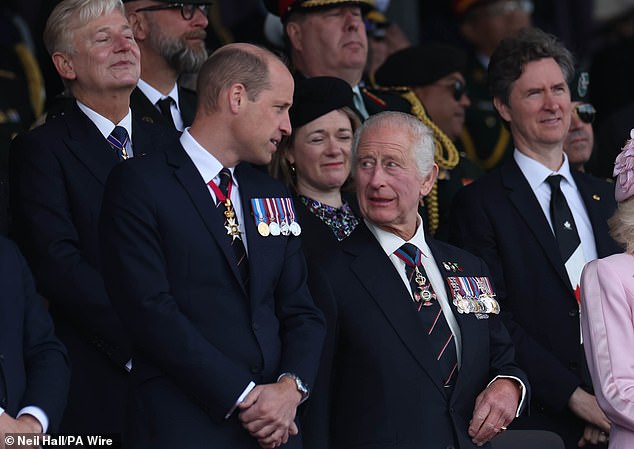
Royal biographer Tina Brown claims that King Charles is ‘underwhelmed’ by William’s failure to pull his weight
Some have suggested that the stress caused by the savagery of Harry’s treatment of his own family might have contributed to either the King’s or Catherine’s cancer. Whether true or not, imagine that thought playing on William’s mind.
Harry has spoken of his desire to bring his children to England, perhaps, even to settle here and to educate Archie and Lilibet in English schools. This has evidently not gone down well with the elder brother – the idea that Harry thinks he can swan back into public consciousness as if all is forgiven appals William.
How galling it would have been for the heir to the throne to see commentators in the Press suggest Harry’s four-day trip to Britain was a roaring success, a reminder of the cheeky chappy royal we have missed, and that his attempts at reconciliation should be welcomed.
An article by Diana’s biographer, Tina Brown – who has the ear of many in the know – must have particularly wounded William.
‘At last, Prince Harry has got it right, which is bad news for the Prince of Wales,’ Brown wrote on her Fresh Hell Substack. ‘As Harry’s buoyant photo ops duelled with Prince William and Kate’s engagements for press coverage this week, you had to ask: Who would you rather hang with? The Tigger-like Duke of Sussex or sober, appropriate William and infinitely perfect Kate.’
Brown went on to claim that King Charles is ‘underwhelmed’ by William’s failure to pull his weight.
She pointed out that in the last year, William completed only 107 days of engagements. Even while suffering from cancer and receiving gruelling treatment, the King undertook 175 days of engagements in the same period. The late Prince Philip – God, how we miss him! – undertook over 250 engagements in the year when he was 95. Princess Anne, a chip off the old block, hardly allows a week to pass in which she is not working tirelessly, often – like the late Duchess of Kent – unobserved, for such good causes as Save the Children.
In the past seven months, the Waleses have had five confirmed family vacations, a fact seized on gleefully by Ms Brown, a former editor of Vanity Fair and the New Yorker, to suggest William was workshy.
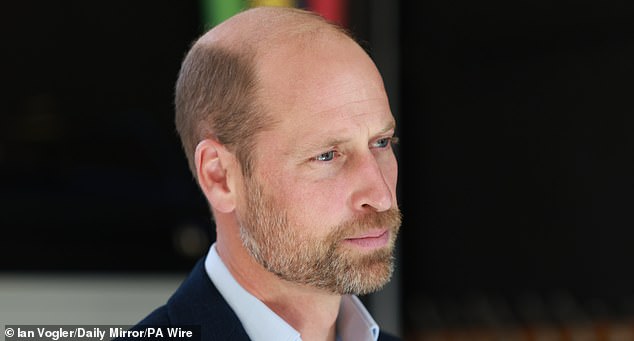
How galling it would have been for the heir to the throne to see commentators in the Press suggest Harry’s four-day trip to Britain was a roaring success
It would, of course, be a cruel person who did not feel that the Prince of Wales deserved considerable sympathy. His wife has cancer, and both she and William have suffered all the strains this imposes, both on their own relationship, and on that with their three young children.
What is more, those who sing the National Anthem, hoping that Charles will be ‘long to reign over us’, do so in the sadly realistic knowledge that the present reign might, in fact not be as long as we would wish. William therefore faces the prospect of becoming King when he is still a relatively young man. Four decades and more of public duty stretch ahead. Why would he not prioritise family life in such circumstances and spend precious time with George, Charlotte and Louis? And yet, according to Tina Brown, his self-proclaimed dedication to being a good parent was taken by Charles as tacit criticism of his paternal skills.
William is already being eased into his future royal role. The King delegates more to him than many realise according to ex-courtiers, and he sits in meetings that were once run by his father. On a more parochial level, he now oversees the shoots at Balmoral and Sandringham – a key job among family roles.
It is becoming apparent that William likes to do things his way or, as a senior member of the royal household who has observed the father-son dynamic put it: ‘As direct heir, he sometimes seems to forget, whether by accident or design, that there is a hierarchy and that he ranks one below his father.’ Another source claimed that ‘deference does not appear to be in his vocabulary when it comes to the King’.
All part of the modern monarchy he aims to build, no doubt. But there are dangers here.
Unlike his grandmother Queen Elizabeth II, William will not become king of a nation united in its spontaneous belief in monarchy. A recent survey shows that 60 per cent of people between the ages of 16 and 30 believe that Britain should become a republic, and, alarmingly, only about half of older age groups are in favour of the monarchy continuing.
When Queen Elizabeth II died, there was an outpouring of grief which did, quite genuinely, unite the nation. But united us in the recognition that we revered her – her dutiful acceptance of the burden and responsibility of her office without question.
William appears to want things to be more casual. He told one interviewer that he would never be royal with a capital R. Yet if you are Prince of Wales, royal with a capital R is what you are. William has said that he does not expect Prince George to serve in the military unless he chooses to do so. But, again, the monarch is someone whose role is deeply entwined with the life of the Armed Forces.
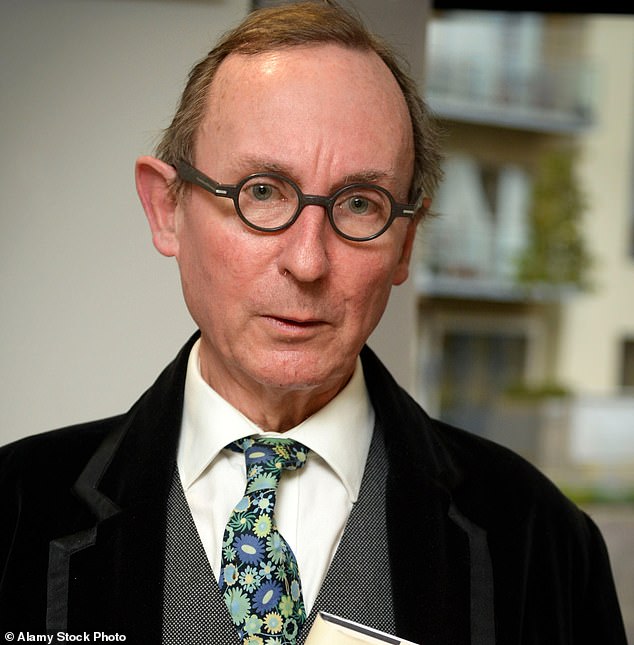
A.N. Wilson writes that unlike his grandmother Queen Elizabeth II, William will not become king of a nation united in its spontaneous belief in monarchy
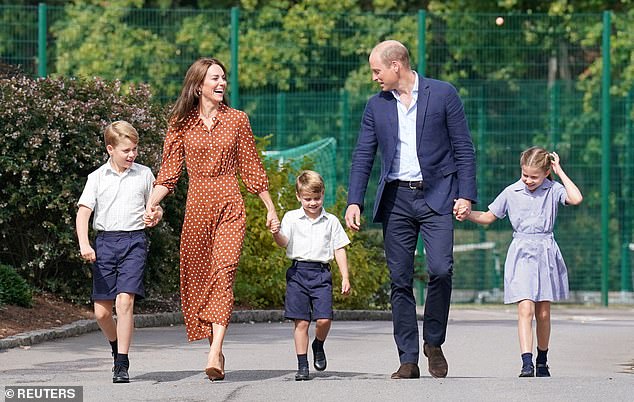
Why would William not prioritise family life in such circumstances and spend precious time with George, Charlotte and Louis?
Even quite cynical members of the services, during the reign of the late Queen felt they were serving her. The fact that the King turns up in uniform on formal occasions – not just to functions for the Army, Navy or Air Force – is a sign to everyone that he once served in the Royal Navy, and has ‘done his bit’. Casually to remark, as William did, that he did not expect George to serve in the Armed Forces could be taken as a failure to grasp the job specifications.
Queen Elizabeth was a woman of faith. Her Christianity defined her entire attitude to life. Charles, bafflingly, has said he wants to be the Defender of Faiths. None of us can guess what this is supposed to mean – and when we watch him entertaining fire worshippers and witch doctors in the gardens of Highgrove we would probably rather not ask too deeply.
But William has made it clear that he is not a believer. Nothing wrong with this if we are talking of him as a private individual. But, again – as with the military – it is part of the job specification that the monarch is Supreme Governor of the Church. The heavy concerns of history are bearing down on William. Can he adjust the monarchy ashe wants to? Can he do so while retaining public affection for the institution?
Above all, to my mind, does he feel queasy about the £23 million per annum, he derives from the Duchy of Cornwall? Because by hanging on to the loot, he could jeopardise the monarchy.
When the public is in love with the Royal Family, it is prepared to overlook their besetting sin, which is conspicuous consumption and lavish living. Does the King really need so many houses – the Castle of Mey, Birkhall, Sandringham and Highgrove? His properties in Romania are all privately owned, in addition to the palaces and castles which go with the job.
If the public is in a mood to question the royals and their behaviour – as will happen once more when yet more revelations come out about Prince Andrew and the convicted paedophile Jeffrey Epstein – then they will rightly ask what on earth makes them think they are entitled to this vast amount of wealth. Particularly if it is in return for just 107 engagements per year performed by a man who does not seem to relish the role
Public sympathy for Kate and for the King – both of them visibly still far from well and deeply affected by Harry’s egregious behaviour – is palpable. But sympathy for them in person is not the same as being sympathetic to the idea of what they stand for.
When Queen Elizabeth became Head of State, the hereditary principle was something still believed in by many – witness the fact that the composition of the House of Lords in the 1950s was all hereditaries. Now, they have gone and the idea of an hereditary Head of State is not something anyone can take for granted.
The King in waiting needs to make a case for it if he is not to find himself booted out by a hostile public. Princess Diana once told me that during the English Civil War in the 1640s, her ancestor Earl Spencer had fought against the King on the side of Oliver Cromwell. This was historically untrue – in fact that Earl Spencer died fighting in the royal cause. But, she went on to say to me, she did not think there would be a monarchy after Charles had died.
William will need to work hard and employ his mother’s radiant and irresistible charm if her prophecy is not to be fulfilled. Little wonder he seems so subdued.











